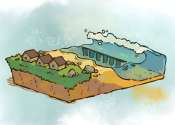Three companies in the running for NASA's next moon rover
Three companies are in the running to provide NASA's next moon rover for crewed missions planned later this decade, the space agency said Wednesday.

Three companies are in the running to provide NASA's next moon rover for crewed missions planned later this decade, the space agency said Wednesday.
Space Exploration
Apr 4, 2024
0
111

The beautiful, gnarled, nooked-and-crannied reefs that surround tropical islands serve as a marine refuge and natural buffer against stormy seas. But as the effects of climate change bleach and break down coral reefs around ...
Ecology
Mar 26, 2024
0
25

Cornell researchers took a novel approach to explore the way microstructure emerges in a 3D-printed metal alloy: They bombarded it with X-rays while the material was being printed.
Analytical Chemistry
Oct 10, 2023
0
1

"Dwell fatigue" is a phenomenon that can occur in titanium alloys when held under stress, such as a jet engine's fan disc during takeoff. This peculiar failure mode can initiate microscopic cracks that drastically reduce ...
Condensed Matter
Nov 11, 2022
0
109

Most sensible air travelers dread turbulence. A little atmospheric hiccup can shake airplanes, rattle nerves and spill beverages. A Cornell University-led study found that birds don't mind at all.
General Physics
Jun 15, 2021
0
17

Understanding how a drop or bubble suspended in a larger mass of fluid divides into multiple pieces is invaluable for engineers designing chemical reactors, engines and ships, as well as for geoscientists studying interactions ...
General Physics
Dec 18, 2019
0
74

Research published this week in Science Advances shows that it may be possible to create rocket fuel that is much cleaner and safer than the hypergolic fuels that are commonly used today. And still just as effective. The ...
Materials Science
Apr 5, 2019
10
416

The astronauts of the International Space Station welcomed the arrival of what we call the "Bigelow Bungalow", officially known as the Bigelow Expandable Activity Module (BEAM) on April 10.
Space Exploration
Apr 13, 2016
0
4484
The US Congress, entrenched in a titanic budget battle, managed to come together Thursday to pass legislation that prevents a market shortage of helium.
Materials Science
Sep 26, 2013
15
0

Landing astronauts safely on Mars is one of the biggest technological hurdles for any future manned mission to the Red Planet, even more complicated than last year's daring rover touchdown.
Space Exploration
May 8, 2013
33
0